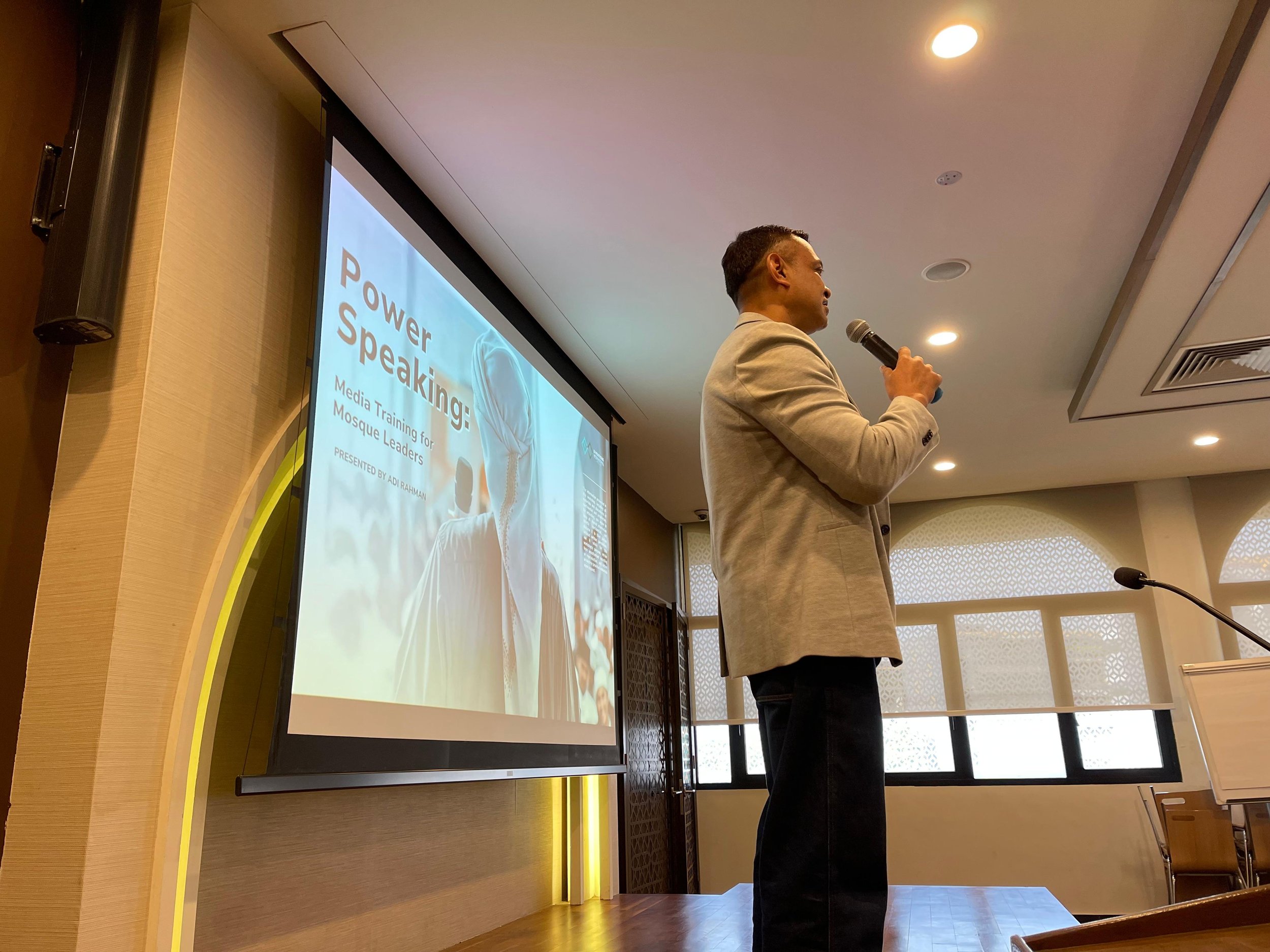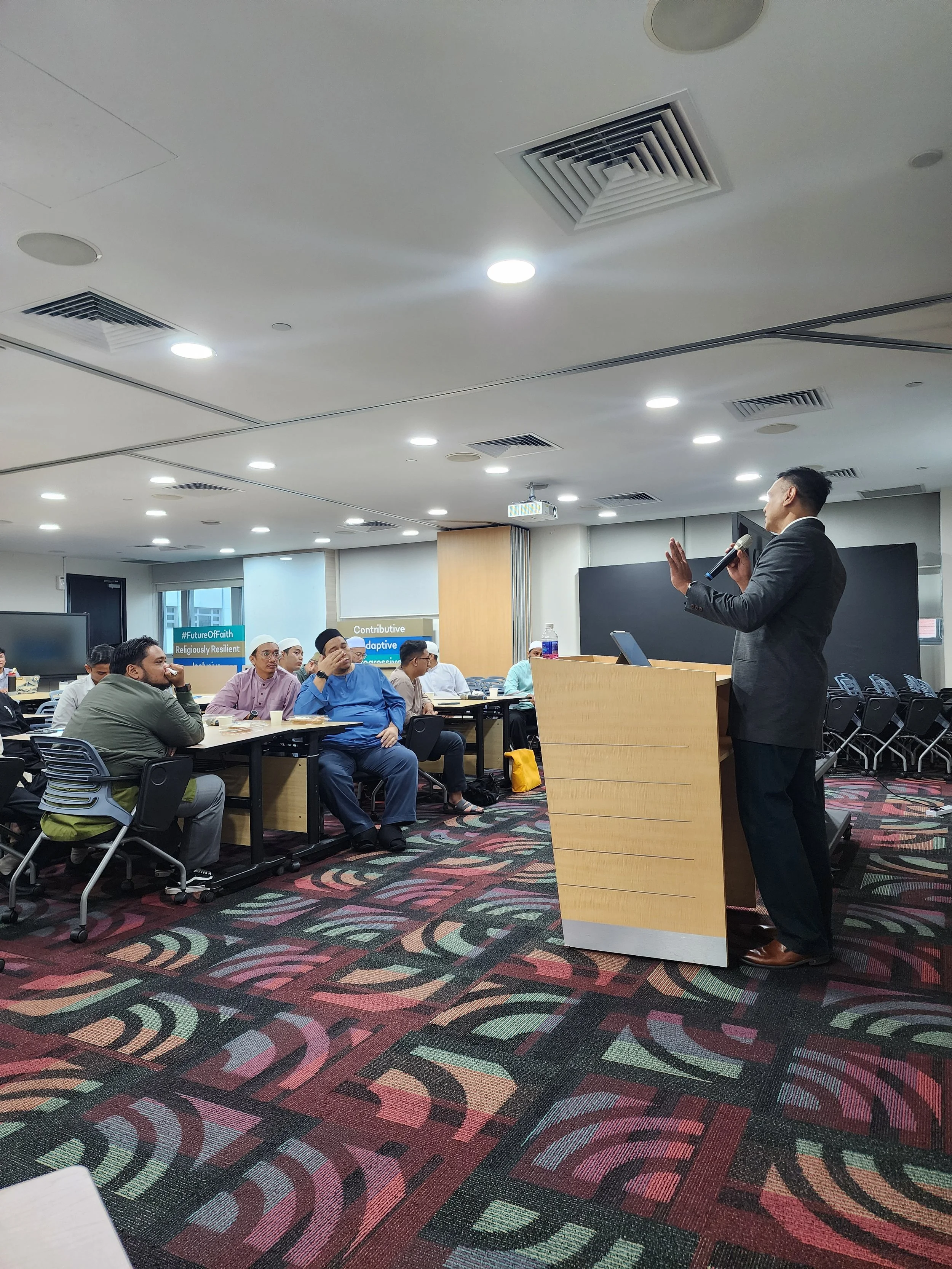Organisational Workshops: Planting Seeds for Growth
Overview
Not all transformative work happens at public events or large-scale celebrations. Some of our most impactful work happens within organisations—in intimate training spaces where real capacity-building unfolds. When an organisation invests in developing their people, they're investing in their future. We design and facilitate workshops that equip leaders and teams with communication and engagement skills that directly strengthen how they operate, how they represent themselves, and how they serve their communities.
Featured Workshops
"Power Speaking": Media Training for Mosque Chairmen (2025)
-
We conducted an intensive media training workshop for mosque chairmen at Masjid Yusof Ishak, led by our Director, Adi Rahman—a veteran broadcast media professional.
The programme equipped leaders with communication skills for navigating Singapore's complex media landscape and representing their communities with confidence. We covered verbal and nonverbal communication techniques, understanding Singapore's context and sensitive boundaries for religious organisations, and practical crisis communication strategies.
Through structured discussions, we explored real-life scenarios involving religious sensitivity, controversy, and misinformation—sharing examples of best practices to demonstrate what to say versus what to avoid, ensuring communications maintain religious authenticity whilst remaining appropriate for Singapore's multicultural society.
-
Media Skills Require Consistent Development — One workshop session plants important seeds, but public speaking and media engagement are skills that need ongoing nurturing and practice over months and years. This session served as an important starting point, introducing participants to strategic thinking about communication and highlighting areas where continued coaching would create real growth.
Religious Leaders Face Unique Communication Challenges — When representing an organisation in a multicultural, multi-religious context, religious leaders navigate layers of sensitivity that require careful, intentional communication. Understanding these nuances—the delicate balance between authenticity and appropriateness—allowed us to make the training contextually relevant rather than generic. Leaders recognised themselves and their challenges in what we discussed.
"Dari Mimbar ke Hati" (From Minbar to Hearts): Empowering Imams in Singapore (2024)
-
We designed and conducted a two-session workshop at Muis Academy for imams across Singapore. Led by our Director, Adi Rahman, the programme addressed a core challenge: whilst imams receive pre-written khutbah scripts to ensure consistency, transforming someone else's words into heartfelt, authentic delivery requires specific skills.
At the heart of the programme was a universal principle: meaning what you say and saying what you mean. We covered voice modulation, body language techniques, engaging diverse age groups, and methods for internalising content to deliver with genuine conviction.
-
Authenticity Must Be the Foundation — The gap between reciting prepared content and delivering with genuine conviction is real and significant. Imams recognised this challenge immediately. Teaching technical skills—voice modulation, body language, pacing—gives practitioners tools to bridge that gap, but the real transformation happens when they continue practising long after the workshop ends.
Voice and Body Language Are Learnable Skills — What stood out was how quickly participants grasped that vocal delivery and body language can be intentionally developed and improved. This awareness alone—understanding that these aren't innate talents but skills that can be practised—shifts how people approach their work. Giving them specific techniques to focus on creates an actionable starting point for ongoing development.
Cross-Project Learnings
What We Believe Makes Organisational Workshops Work:
✦ Customisation Is Non-Negotiable.
Generic workshops delivered to any room produce generic results. We learned that meaningful learning starts with understanding an organisation's unique context—their leadership structure, culture, specific challenges, and communication landscape. That understanding shapes everything: the content, examples, case studies, pace, and tone all shift based on who you're serving. When participants recognise that a workshop was genuinely designed for them—not just adapted slightly—they engage differently. They feel seen, and that trust becomes the foundation for actual learning. That's what transforms a workshop from generic to genuinely relevant.
✦ Transformation Requires Time and Continuity.
A single workshop session is a beginning, not a destination. Skills and mindset shifts require consistent nurturing over months and years. We learned that the most impactful workshops aren't self-contained events—they're launchpads for ongoing support. Whether that's follow-up coaching, peer communities, or reinforcement mechanisms, the workshop plants seeds; what happens after determines whether they actually grow.


